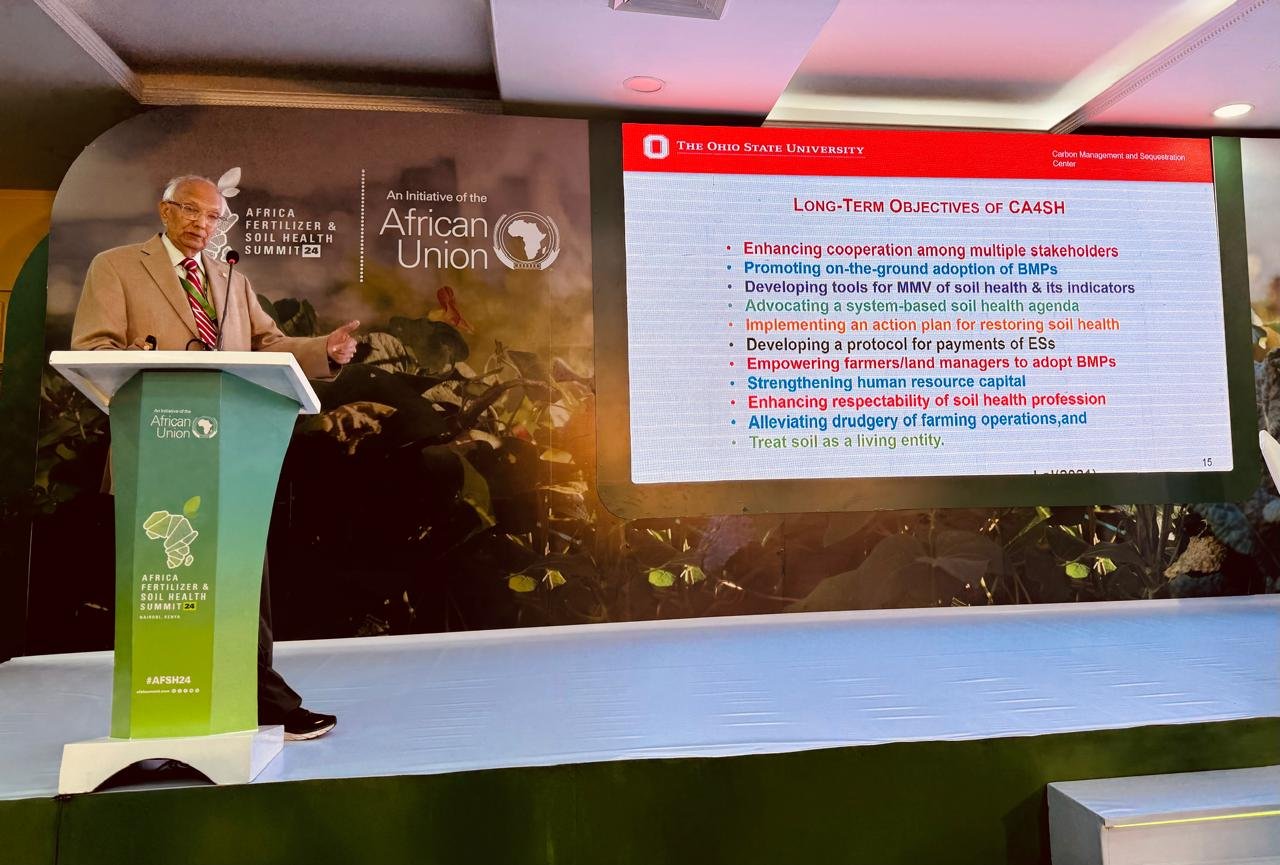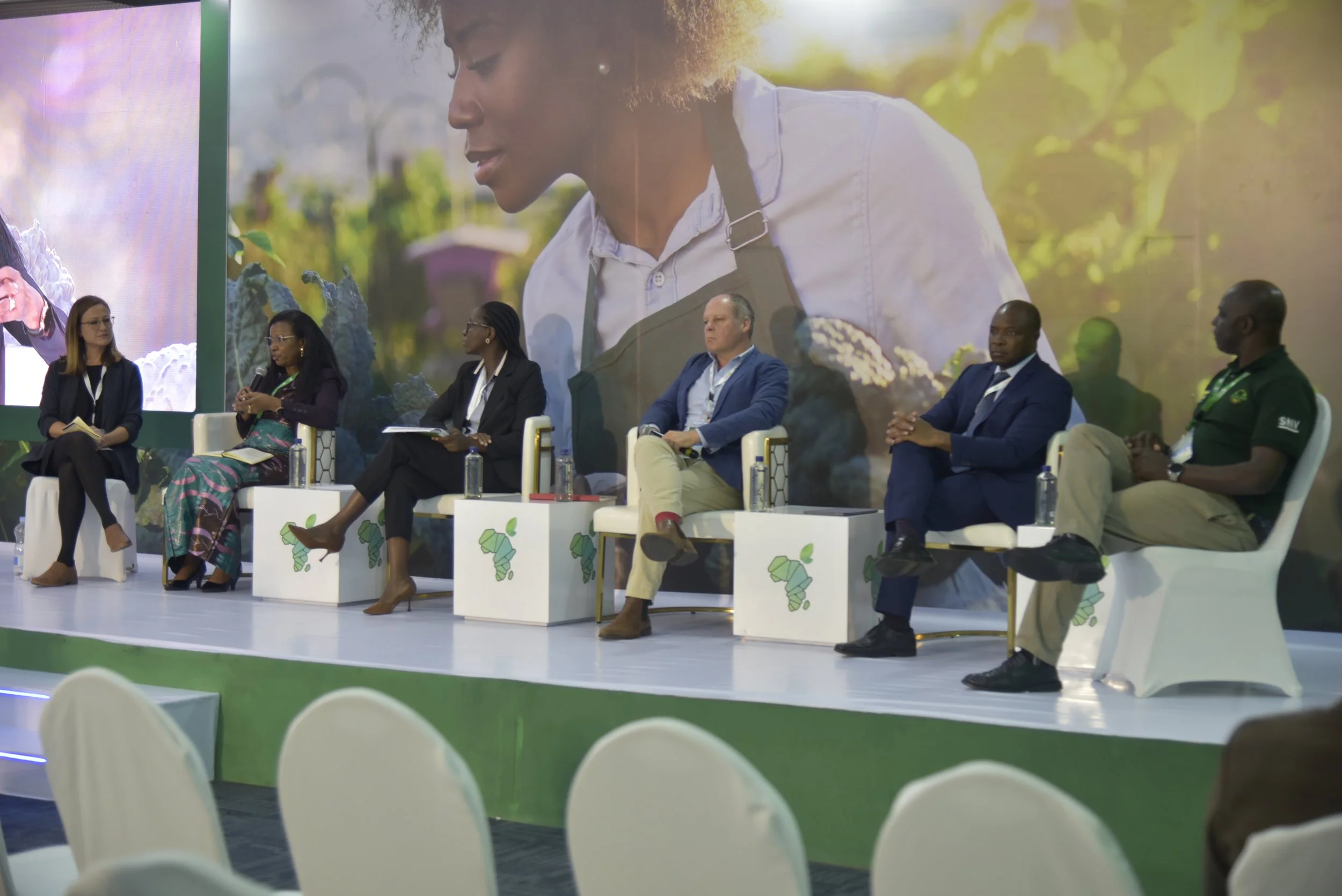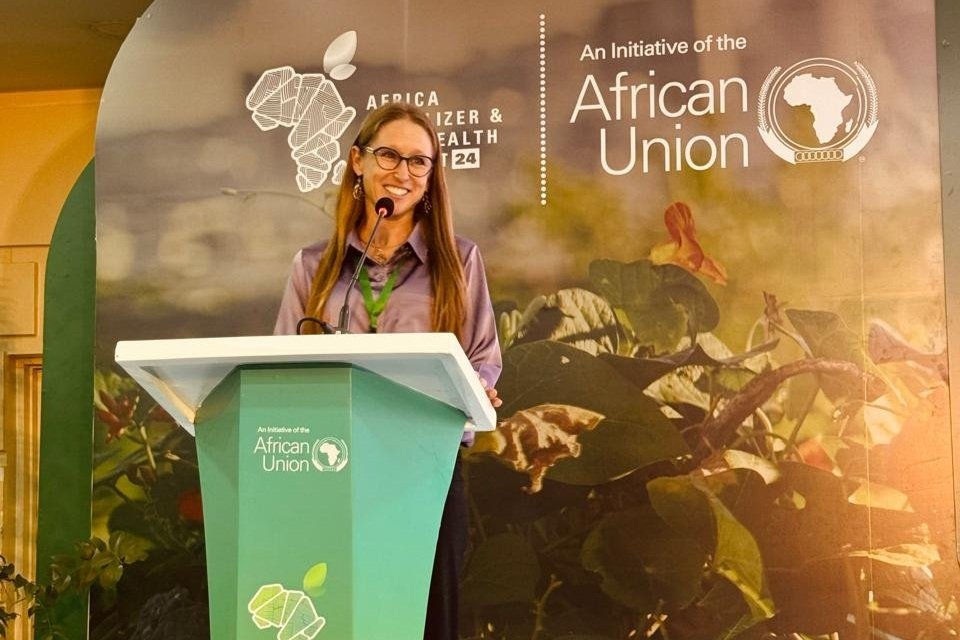CA4SH at AFSHS2024: Multistakeholder action for Africa’s soils
“To be a successful farmer, one must first know the nature of soil””
From 7-8 May 2024, African leaders and stakeholders came together to reverse soil degradation and map a joint way forward for the continent by putting farmers first.
The Africa Fertilizer and Soil Health Summit (AFSHS) was raised to address changes in the agricultural sector in Africa since the 2006 Abuja Declaration on Fertilizer for the Africa Green Revolution. Since the Abuja Declaration, sustainable soil management has become an increasingly recognized priority for reversing land degradation and contributing to the climate adaptation strategies of African countries.
In a CA4SH side event on 8 May, Dr Rattan Lal (CA4SH Co-Founder, Distinguished University Professor of Soil Science at Ohio State University, and Laureate of the 2019 Japan Prize and the 2020 World Food Prize) galvanized audiences at the CA4SH session Soil Matters with stark reminders of the potential for African countries to become leaders in the fight against hunger and land degradation. “Africa will be the bread basket of the World,” he said, referencing the abundant natural resources found across the continent, as well as its potential to feed 9 billion people. “It can feed itself and the World by translating science into action for adaptation to climate change and by restoration of soil health.”
“Famines are man-made tragedies. We must make famine and mass-starvation politically intolerable, morally toxic, ethically unthinkable, and humanely unacceptable through restoration of soil health.” - Dr Rattan Lal
The AFSHS was convened in Nairobi, Kenya, to draft a 10-year plan for Africa’s soils. “We need a roadmap for Africa - if you don’t have a roadmap you don’t know where you are going,” shared Dr Lal. The Action Plan is supported by commitments from private and public sector stakeholders, as well as a mechanism for financing the plan, and a Soil Initiative for Africa (SIA) which provides a framework to guide investments and efforts to improve soil health.
CA4SH Engagement Summaries
As active proponents of soil health to address all 17 Sustainable Development Goals, CA4SH participated in and hosted several sessions at the AFSHS to bridge science and policy spaces with examples of concerted action on the ground.
Partnering for a Pan-African Soil Information System
Accurate and timely soil data is key to improving our understanding of soil and enhancing soil health. There is currently no comprehensive, consistent, and integrated soil information system in Africa that works across datasets and geographies, so this session introduced actions underway and plans to scale the Soil Knowledge Exchange network which is currently underway in Kenya and Tanzania.
Country plans for integrating the AFSH Action Plan into climate and food security policy frameworks
African countries participate in several international policy mechanisms which provide frameworks for enhancing food security and climate adaptation, but each should be approached with nationally relevant solutions. This session explored examples of this alongside farmer-first approaches.
“Integrating soil health and soil organic carbon into Nationally Determined Contributions (NDCs) is a critical opportunity in Africa to achieve their climate change mitigation and adaptation targets” - Ermias Betemariam, Soil Scientist, CIFOR-ICRAF
Leveraging Policy, Practice and Research for Monitoring Soil Health
This event highlighted the importance of monitoring soil health in national and regional policy frameworks, and included the official launch of the AUDA-NEPAD partnership with NORAD on the Accelerating Action on Soil Health for Sustainable Agri-Food Systems transformation in Africa. Dr Manyewu Mutamba (Head (Ag) of Agriculture, AUDA-NEPAD) asserts that “at the heart of our discussions on soil health, we must ensure that the well-being of the farmers, who benefit from soil health, is taken into consideration,” setting the intention of this partnership which will support Member States to implement their own Soil Health Declarations.
Demystifying Soil Health in Africa
This session clarified the concept of soil health in practice in the context of African agriculture, fertilizer use efficiency, and predominantly smallholder agriculture, and explored best practices and success stories related to research, adjusting research results to farmer realities, smallholder farmer capacities and knowledge, and the importance of soil health management in landscapes.
“When it comes to soil health, there is a need for a paradigm shift from demo plots to working with farmers on farmers field across landscape scale - from the mountains all the way to rangelands" - Dr Leigh Winowiecki, Global Research Lead for Soil and Land Health, CIFOR-ICRAF, Co-Founder, CA4SH
Digging Deeper: Advancements in Soil Health Monitoring for Sustainable Food Systems and Climate Resilience
Enhancing soil health in Africa necessitates robust and innovative monitoring to produce actionable data that can support decision making. This session explored the role of policy in supporting monitoring initiatives, and discussed the importance of multi stakeholder collaboration. The session explored existing mechanisms of data collection and opportunities to bridge knowledge gaps.
Operationalizing the Fertilizer and Soil Health Framework at National Level: Multistakeholder Collaboration for Results at Scale
This session focused on the importance of multistakeholder collaboration for carrying out the Soil Initiative for Africa and the role of investments for carrying out the initiative.
Soil Matters: Cultivating Change for Africa’s Food Systems Transformation through Evidence-based Policy and Practice
This session showcased evidence and examples of how improving soil health on African farms impacts food and nutrition security, improves livelihoods and supports economic development, climate mitigation and adaptation. The session was backed by evidence from soil health monitoring interventions to transform Africa’s food systems into climate solutions. Multistakeholder speakers shared actions to drive evidence-based implementation, public and private investment and policy for healthy soil, and advocated for increased knowledge sharing across sectors, partners and countries.
The Science, Policy, Finance Nexus
Change does not happen in a vacuum. Multistakeholder approaches are our best bet for supporting Africa’s food systems transition, and there is no better unifier than soil health. The wealth of expertise shared by CA4SH partners during side events at the AFSHS exemplifies the various mechanisms and sectors involved in this process toward the common goal of building resilience on African soils with African farmers at the core of the work. Dr Leigh Winowiecki called on the need to look beyond yields as the main indicator of successful transformation, and instead consider all ecosystem services that soil provides, including climate change mitigation, ecosystem restoration, and food and nutrition security. Dr Winowiecki stressed the question of why we collect data and what for. Monitoring is about more than digging a hole in the ground: it must be usable, actionable, and used to drive conservation with soil as the foundation of indicators.
“We need to have the talk with government and farmers in the same room,” said Gertrude Nalubinga Mwebaza (Farm Radio International), underscoring the need for collaboration to span scales as well as sectors. Farmers are at the heart and the frontlines of food systems transformation, so finance mechanisms should be accessible and create an enabling environment for farmers to adopt regenerative practices. “A blended financing approach is the only way to approach near-term financing needs and ensuring long-term scalability,” said Anna Carson (One Acre Fund) who are spearheading finance programs in nine African countries.
Science, policy, and finance are interdependent when it comes to food systems transformation that puts farmers first. Policy needs robust indicators to track progress and farmers who are able to implement sustainable soil practices. Science and farmers in turn need subsidies and support to carry out important work on the ground. To achieve the outcomes of the AFSHS, we need all these actors to work together.






































A Call to Action to Scale Global Soil Health
The status quo isn’t working anymore, and the results of the AFSHS are indicative of their readiness and willingness to improve African soil health. Thirteen commitments were made in the Nairobi Declaration, and CA4SH stakeholders contributed calls to action from amongst the various sectors we represent.
Dr Manyewu Mutamba expressed that now governments have taken the first step it’s time to follow through on the outcomes of AFSHS. André de Jager (SNV) reminded audiences that an Action Plan is a good start, but a plan is still not an action; we need a bottom-up approach.
CA4SH has participated highly and effectively in the AFSHS process and outcomes, and we are well-placed to help drive the Action Plan. The multistakeholder coalition aligns our targets with the approach of the CA4SH working groups who have made incredible progress for global soil health in the three short years since our launch.
Learn more in the 2023 CA4SH Annual Report. Together, we can translate the “A” in CA4SH to the African Fertilizer and Soil Health Action Plan.









